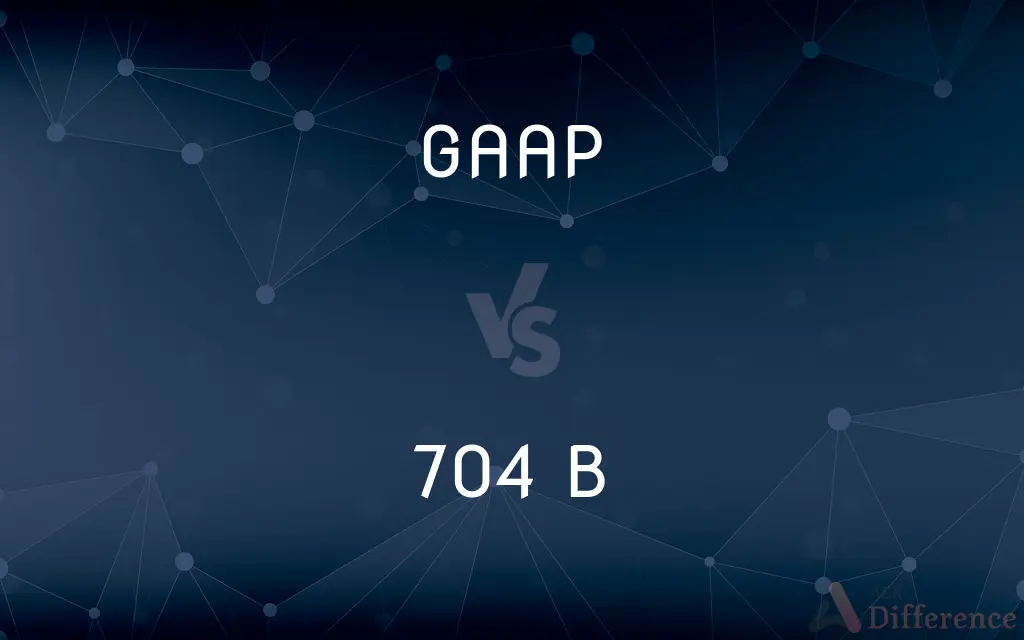GAAP vs. 704 B — What's the Difference?
By Tayyaba Rehman — Published on December 8, 2023
GAAP refers to Generally Accepted Accounting Principles, a set of accounting standards, while 704 B relates to a U.S. tax code section on partners' distributive share of income or loss.

Difference Between GAAP and 704 B
Table of Contents
ADVERTISEMENT
Key Differences
Foundational Purpose: GAAP is a comprehensive set of accounting rules and standards designed to guide financial reporting and ensure consistency across entities. 704 B, on the other hand, stems from the U.S. tax code, specifically addressing how partnership income, gains, losses, and deductions are allocated among partners.
Origination and Authority: GAAP originates from a mix of authoritative standards and commonly accepted ways of recording and reporting transactions. The Financial Accounting Standards Board (FASB) primarily oversees it. 704 B, meanwhile, is a section of the Internal Revenue Code (IRC) and is overseen by the IRS.
Scope and Applicability: While GAAP applies broadly to public companies and many private entities in the U.S. to ensure financial reporting uniformity, 704 B is narrower in scope, focusing on the allocation and distribution dynamics within partnerships.
Outcome and Objective: By adhering to GAAP, entities aim to present accurate, reliable, and clear financial statements. With 704 B, the goal is to ensure that tax consequences from partnership activities are fairly and equitably allocated among partners.
Practical Implications: Entities audited by external parties usually need to ensure GAAP compliance for credibility. In contrast, partnerships must consider 704 B to ensure allocations meet the substantial economic effect test, thereby being respected for tax purposes.
ADVERTISEMENT
Comparison Chart
Origin
Accounting standards
U.S. tax code
Overseeing Body
Financial Accounting Standards Board (FASB)
Internal Revenue Service (IRS)
Main Focus
Financial reporting standards
Partners' distributive shares of income, gains, losses, deductions
Applicability
Broad (public and many private entities)
Specific (partnerships)
Purpose
Uniformity in financial reporting
Fair tax allocation within partnerships
Compare with Definitions
GAAP
A set of accounting principles that standardize financial reporting.
Companies listed on the stock exchange usually adhere to GAAP for transparency.
704 B
A U.S. tax code section pertaining to partners' distributive shares.
The partnership agreement was structured keeping 704 B regulations in mind.
GAAP
Rules to ensure clarity and consistency in financial statements.
To attract investors, the startup decided to follow GAAP in their financial disclosures.
704 B
Addresses allocations of partnership income, loss, and deductions.
To avoid any tax discrepancies, the firm closely followed the stipulations of 704 B.
GAAP
A guideline for recording and presenting financial transactions.
By adhering to GAAP, the company ensured their financials were easily comparable to competitors.
704 B
A cornerstone for tax considerations in partnership agreements.
Their lawyer emphasized the importance of 704 B when drafting the partnership terms.
GAAP
A framework ensuring the reliability of financial information.
Trust in the firm's financial statements was maintained due to their strict GAAP compliance.
704 B
Ensures tax allocations within partnerships have substantial economic effect.
The IRS audited the partnership, focusing on the 704 B substantial economic effect test.
GAAP
Standards primarily overseen by the FASB in the U.S.
When the FASB issued a new GAAP guideline, all U.S. public companies took note.
704 B
Part of the Internal Revenue Code supervised by the IRS.
When facing tax queries, they consulted 704 B of the IRC for clarity.
GAAP
A collection of rules and procedures and conventions that define accepted accounting practice; includes broad guidelines as well as detailed procedures
Common Curiosities
What is the main purpose of 704 B?
704 B ensures that allocations of partnership income or losses are equitable among partners for tax purposes.
How does 704 B affect partners individually?
704 B affects how tax consequences from partnership activities are allocated among individual partners.
Are all companies required to follow GAAP?
Public companies and many private entities in the U.S. follow GAAP, but it's not mandatory for all.
Who oversees the rules of 704 B?
The IRS oversees and enforces 704 B as it's part of the Internal Revenue Code.
Does GAAP apply to non-profit organizations?
Yes, many non-profits in the U.S. also follow GAAP for their financial reporting.
What does GAAP stand for?
GAAP stands for Generally Accepted Accounting Principles.
Who establishes GAAP rules?
The Financial Accounting Standards Board (FASB) primarily establishes GAAP rules.
Why is GAAP important?
GAAP ensures consistency, clarity, and reliability in financial reporting, enhancing trust among stakeholders.
What entities should be concerned about 704 B?
Partnerships, as 704 B deals with partners' distributive shares of income, gains, losses, and deductions.
Is 704 B applicable to corporations?
No, 704 B specifically addresses partnerships and their partners.
Why is 704 B crucial for partnership agreements?
It ensures tax allocations in partnership agreements meet specific criteria and are respected for tax purposes.
Are GAAP and 704 B ever interrelated?
While GAAP focuses on financial reporting and 704 B on tax allocations, tax considerations might influence financial statements, leading to some intersections.
Are GAAP rules the same internationally?
No, while the U.S. follows GAAP, many other countries use the International Financial Reporting Standards (IFRS).
How often is the Internal Revenue Code, including 704 B, updated?
The IRC can be updated periodically based on legislative changes, which may impact sections like 704 B.
Can a company claim to use GAAP if they modify some principles?
A company can use a modified GAAP, but they must disclose deviations from the standard GAAP in their financial statements.
Share Your Discovery

Previous Comparison
Monohybrid Cross vs. Dihybrid Cross
Next Comparison
Abstract Class vs. Concrete ClassAuthor Spotlight
Written by
Tayyaba RehmanTayyaba Rehman is a distinguished writer, currently serving as a primary contributor to askdifference.com. As a researcher in semantics and etymology, Tayyaba's passion for the complexity of languages and their distinctions has found a perfect home on the platform. Tayyaba delves into the intricacies of language, distinguishing between commonly confused words and phrases, thereby providing clarity for readers worldwide.










































